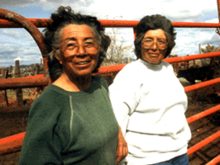Carrie Then

Carrie Dann (* 1932 ) is an American Indian and environmental activist .
Then lives as a rancher in Crescent Valley , Eureka County (Northern Nevada), she is a member of the "Western Shoshone National Council", the government of the Western Shoshone Nation .
Fight for land rights
Carrie Dann comes from the people of the Western Shoshone and has been campaigning for their land rights (" Treaty of Ruby Valley " with the US government in 1863) and against environmental destruction (including gold mining, nuclear tests ) in the traditional settlement area of the Western Shoshone for decades , which they " Newe Sogobia "is called and includes almost 2/3 of the US state of Nevada and the peripheral areas of Idaho in the north and California in the southwest (Timbisha-Shoshone, Death Valley ).
Together with her sister Mary , who died in 2005 , Carrie Dann received the Right Livelihood Award in Stockholm in 1993 for her tireless struggle for the recognition of the land rights of her people. For a long time, the Dann sisters opposed the US policy of retrospectively legitimizing the annexation of the Western Shoshone treaty country through a compensation payment from Washington, DC. The US federal authorities, namely the Bureau of Land Management (BLM), had tried repeatedly in the past to confiscate the horses and cattle from the Dann ranch, allegedly to prevent "overgrazing" and as "compensation" for unpaid grazing fees.
See also
literature
- Klaus Huhn : "Winnetou's Daughters - Why Mary and Carrie Dann were awarded the Alternative Nobel Prize" . Spotless-Verlag, Berlin 1994, ISBN 3-928999-30-3 .
Web links
- Literature by and about Carrie Dann in the catalog of the German National Library
- "Our Land, Our Life" , 30-min. Documentary about the Dann ranch and the land rights struggle of the Dann siblings (Youtube)
- Portrait at rightlivelihoodaward.org (English)
Individual evidence
- ↑ cf. the entry Mary and Carry Then in the list of RLA prizewinners ; accessed May 14, 2019.
- ^ "Statement by Carrie Dann, Western Shoshone Grandmother, regarding a House vote on the Western Shoshone Distribution Bill", Washington, DC, June 1, 2004 [1]
- ↑ See "Western Shoshone Nation Responds to Place Crescent Valley Horse Issue" , communication from the "Western Shoshone Defense Project" (private solidarity group), KBR Net Wild Horse & Burrow News, Jan. 15, 2003, and the Spiegel TV report by Paul Nellen from Oct. 18, 1993 about the land rights struggle of the Western Shoshone
| personal data | |
|---|---|
| SURNAME | Then, Carrie |
| BRIEF DESCRIPTION | American environmental activist and Indian woman |
| DATE OF BIRTH | 1932 |